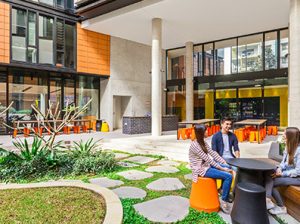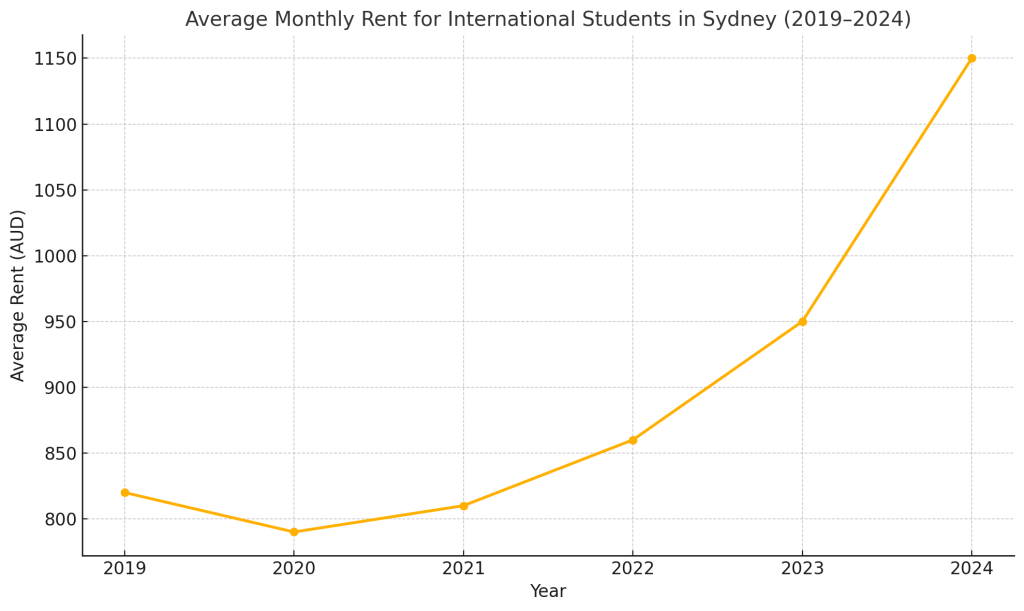
By Xiaoyi Liu, for ABC News Online
“Rent in Sydney is crazy high, especially for international students. Even a PhD feels like a financial gamble.”
This is the reality of Daisy, a graduate student international living in Chatswood. Her weekly student dormitory fee is as high as 570 Australian dollars. She said that rent took up most of her living budget – not even including tuition fees, textbooks and groceries.
In the broader cost-of-living crisis in Sydney, international students are facing a housing crisis, and this crisis has largely remained unresolved. While local Sydneysiders are struggling to cope with rising interest rates and tight rental supplies, overseas students are in an extremely vulnerable situation: high tuition fees, lack of welfare support, and a highly competitive rental market where demand far exceeds supply.
A Silent Crisis Behind Closed Doors
According to SQM Research (2024), rents in Sydney have soared by more than 20% in the past year alone. For international students – who currently contribute over 50 billion Australian dollars to the Australian economy each year (Australian Bureau of Statistics, 2023) – this not only brings economic inconvenience but also hinders their education and well-being.
Daisy found her current apartment through a major student housing provider’s website. “It felt safer and more trustworthy,” she said. But even with a legitimate platform, the competition was fierce. “Getting a spot was extremely stressful. Most properties near the city were too hectic or expensive, so I had to move further north.”
While she says her current location offers relative safety and financial stability, the situation is far from ideal. “If I need to go to the main campus in Camperdown, even two train stops away can feel like a journey—especially during transport strikes or heavy rain. It’s not just rent, it’s the whole logistics.”
 This “spatial marginalization” is quietly changing the campus experience of international students. Once regarded as part of the core vitality of the city, they are now increasingly being “pushed to the periphery”, both geographically and in terms of social support. Many staff members from the student affairs department have pointed out that these students often have difficulty participating in clubs, miss after-school lectures, and even have their academic performance affected due to commuting fatigue. Many people are not simply “unwilling to participate”, but have been deterred by reality.
This “spatial marginalization” is quietly changing the campus experience of international students. Once regarded as part of the core vitality of the city, they are now increasingly being “pushed to the periphery”, both geographically and in terms of social support. Many staff members from the student affairs department have pointed out that these students often have difficulty participating in clubs, miss after-school lectures, and even have their academic performance affected due to commuting fatigue. Many people are not simply “unwilling to participate”, but have been deterred by reality.
From the perspective of educational equity, this structural predicament cannot be ignored. A truly inclusive higher education system should not merely be able to “recruit students”, but also “retain them and live with dignity”. When housing becomes an unbearable burden, it deprives not only the space for study, but also dignity and a sense of belonging.
Institutions must intensify their efforts
The report of the Australian Council of International Students (CISA) shows that over 40% of international students find campus accommodation expensive, and many students choose informal or unsafe accommodation. However, despite the limited official housing options, universities still continue to admit tens of thousands of overseas students every year. 【CISA 2023 Report】
“There’s no rent control or tailored support for us,” Daisy explained. “It would help if universities could work more closely with housing providers to reserve spots or offer discounts. Expanding the campus shuttle service beyond Redfern would be great too.”
Another Chinese international student, Summer, also mentioned the same issue in her interview and offered some suggestions to the students who are about to come to Australia for study. 👉 And it was mentioned that the rapid increase in rent has been particularly obvious in recent years.
At present, the accommodation services of most colleges and universities still remain at the level of “recommended information” rather than being proactively addressed. True student support should go beyond web links and include affordable accommodation, legal consultation, emergency assistance mechanisms, etc. The government and universities could consider establishing an “International Student Rental Agency Platform” to centrally display reputable housing sources and management services, thereby institutionally ensuring that students stay away from the underground rental market.
In addition, urban transportation policies should also take into account the current living conditions of students, promote the development of “public transportation corridors in education areas”, and improve the public transportation connectivity and night safety in the areas around universities. The difficulty in renting a house is no longer merely an individual issue, but a structural challenge that colleges and universities must confront directly in the process of urbanization. If universities hope to maintain their reputation as “global destinations for studying abroad”, they must demonstrate equal strategic importance in their accommodation policies.
The government and the media need to catch up
Students like Daisy and Summer have also called for more discounts on public transportation and rental subsidies, and for the media to better publicize the real costs of student life in Sydney.
“People don’t realise how tough it is. Even small changes would help—like acknowledging we exist in the housing conversation.”
However, this problem is still rarely reported. Most mainstream narratives focus on domestic housing pressure and pay little attention to its impact on the international student group, although the international student group plays a core role in the economic and educational systems.
Time to Act
Source: Author’s visualisation based on Domain and SQM Research data
Inaction will have consequences – not only affecting students, but also damaging Australia’s global reputation as a destination for international students. If future students think that housing is unaffordable or unsafe, they will choose other countries with better support systems.
From the perspective of communication, the media should also pay more attention to the voices of this group. At present, international students are often regarded as “economic figures” rather than members of society. Strengthening the presentation of humanity in news reporting and public dialogue can help reverse the public’s misunderstanding of the “student-funded market” and promote more empathetic policy discussions.
📹 Also Watch: The interview with Daisy
💬 Share your story or join the discussion
📢 Raise awareness:🔗 Share this article







Be the first to comment